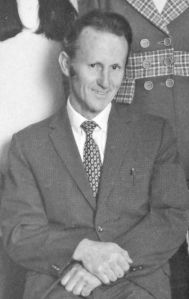
Over the years, I have been very much inspired by my father (Charles Stanley Hayden). He had a great fascination for words and at the meal table he often quizzed the family on aspects of vocabulary. He loved doing crosswords and seemed to do them most days. From an early age, I remember dad working on the New Zealand Herald crossword puzzle. He would call out clues to get me and other family members involved in the activity. He loved words, especially the rarer ones.
He tried his best to do anagram crossword puzzles but he just couldn’t get the hang of them. One of his friends at school was Mr Clyde Vautier of Gisborne, who went on to complete his BA at Victoria University in Wellington. When I was a boy I recall Mr Vautier visiting us in Tauranga and giving dad tips on how to do this type of crossword, but to no long-term avail!
At school, I had to write essays. In those days, English wasn’t my strong subject: I was a “science man”. (As a 12 year old, I managed to find the formula for gunpowder in a library book, and proceeded to make it in a test-tube at home. My ingredients weren’t very pure and the experiment was a failure, very fortunately, otherwise I probably wouldn’t be here to tell the tale.) But I diverge from the essay writing. I couldn’t get inspired to write the essay so I asked dad if he could help me. He did. I think a lot of the essay was written by him, although it was in my handwriting. But when I got it back from the teacher, the teacher was quite surprised at all the big words that “I” had come up with. I think he may have suspected I’d had some help. (I learnt my lesson on plagiarism then, and as far as I know I’ve never indulged in it since!) One word I remember my dad loved to use was the word ‘pertain’ even although much more common words would do just as well!
Looking back, it’s surprising that my dad was so good at English, and vocabulary in particular, though he had only gone up to Standard 6 or 7 (age 12) at school. But he loved to read. One of his favourite books was the historical novel, Mutiny on the Bounty (published in 1932, when dad was 18 years old), based on the mutiny against Captain William Bligh in 1789.
My dad’s fascination with words seemed to have rubbed off onto me: a few years back I completed an MA (Applied Linguistics) thesis on “The Linguistic Ecology of Academic Words in Different Subject Fields”[1]. I dedicated that piece of work to my dad, as he had died a few months prior to my completing it. Since that time, I have dedicated much of my life to helping students in the Middle East, Asia and New Zealand to enhance their proficiency in written and spoken English.
[1] Hayden, R. (1995). The linguistic ecology of academic words in different subject fields (Master’s thesis, Victoria University of Wellington, Wellington, New Zealand). Retrieved from https://www.librarycat.org/lib/SLALS-VUW/item/99770343